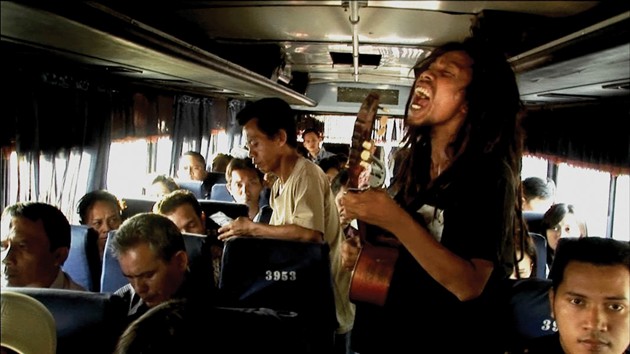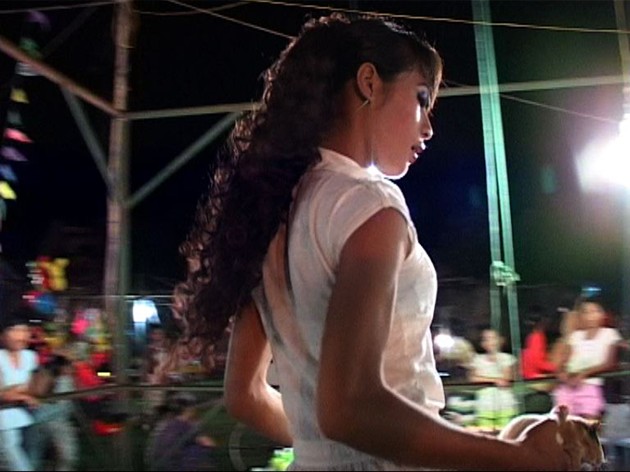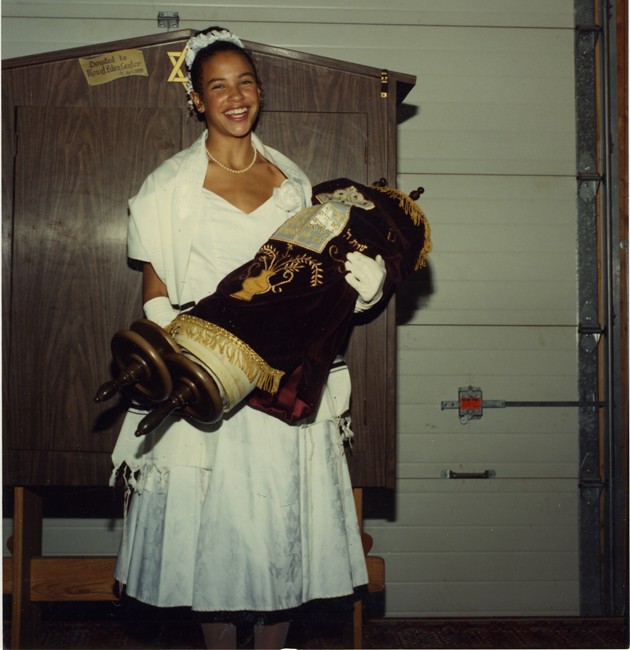
JALANAN (Daniel Ziv)
This lively, engaging, and music-filled debut film from Daniel Ziv follows the lives of three buskers (or pengamen, in Indonesian) in Jakarta who perform on public buses, subsisting largely on the pocket change they gather from passengers. Shot over five years, with a soundtrack consisting largely of these buskers’ original compositions, Jalanan gives us a vivid look at life on the streets; the film’s title is Indonesian for “Streetside.” The characters Ziv focuses on are quite charismatic, with very riveting stories illustrating larger themes of the problems plaguing contemporary Indonesian society.
Boni lives in a sewage tunnel with his wife under a street overpass, his bathing and drinking water provided by a busted pipe carrying fresh water from the municipal reservoir. His jaunty tunes make him sound like Indonesia’s answer to Bob Dylan. Boni’s friend Ho is much more brashly outspoken, sporting a wild, dreadlocked hairstyle that, along with his socially and politically conscious demeanor, makes him somewhat resemble Bob Marley. His songs rail against the corruption and the abusive treatment of the poor endemic to Indonesia. Ho’s also quite the ladies’ man, too, but is looking to settle down into a stable relationship.
Titi’s moving, heartfelt tunes feel the most personal; she’s a divorcee who lives apart from her three children (who live in different cities), and who sends her earnings back to her family in East Java. At the outset, she’s saddled with a parasitic new partner who refuses to work and lives off Titi’s earnings, making her wear a headscarf to please his devout Muslim family. Titi ditches the headscarf, however, when performing on buses or whenever she’s out of her family’s sight. Titi strives to improve her lot in life, eventually going for a high school diploma to get a regular job.
Ziv’s film comes closely on the heels of Joshua Oppenheimer’s The Act of Killing, another celebrated documentary on Indonesian by a non-Indonesian filmmaker. Jalanan, though very different in style and tone, compellingly makes many of the same points about Indonesia’s uneasy transition to democracy, and many of the people who have been left behind in the country’s rapid modernization.
(October 24, 10pm)

HAPPINESS (Thomas Balmès)
Thomas Balmès, the French documentarian best known for his very popular 2010 globe-trotting film Babies, settles in one place for his latest, Happiness: the kingdom of Bhutan. The film begins with footage of King Jigme Wangchuck’s 1999 announcement that he would introduce TV and the internet to Bhutan to increase the population’s “gross national happiness.” The king wryly notes that this was the only point in his speech that garnered cheers and applause.
Happiness fast forwards from that to focus on the small village of Laya, one of the last places to be wired for electricity so that people can enjoy these new (to them) technologies. These events are relayed through the eyes of Peyangki, an eight-year old boy whose mother sends him to a monastery because she can’t afford to educate and feed him and his five siblings. Peyangki’s mother has struggled since her husband’s death (from a heart attack after encountering a bear), and only has her brother to help around the house. Peyangki reluctantly goes to the monastery, where he doesn’t seem to get much education – he only seems to recite the same Buddhist text over and over – and only has two other students to keep him company, the others having left for the city. The lama who runs the monastery seems kindly enough when we first see him, but Peyangki later says to someone that the lama beats him. Peyangki frequently leaves the monastery to visit home or travel with his uncle to the city.
Happiness makes some rather predictable and obvious points about what happens when remote areas of the world encounter modern technology. The film’s concluding montage of a succession of slack-jawed faces watching a wrestling match drive this point home with very little subtlety. However, what elevates this film is the presence of the spunky, irrepressible Peyangki, whose boundless curiosity about the world and his playful spirit make many scenes, such as his wide-eyed wonder at the sights during his first trip to the big city, quite delightful and infectious. Also, the handsome photography of Bhutan’s Himalayan vistas certainly doesn’t hurt the film either.
(October 24, 7:30pm)

MADAME PHUNG'S LAST JOURNEY (Tham Nguyen Thi)
This fascinating and moving film follows a traveling group of drag performers who perform for people in the rural back roads of Vietnam. This remarkable debut feature vividly captures the experiences of life on the road for these performers, and how they must contend with a society which continues to severely marginalize them. The film introduces us to a great character, that of Bich Phung (the “Madam” of the title), who struggles to keep the finances and the sometimes volatile personalities of her performers under control.
The traveling troupe offers many entertainments for the audiences they encounter. They don’t charge admission, earning money other ways, such as from the lottery tickets they sell for door prizes; other fair activities such as a merry-go-round, a miniature train ride, balloons, and darts are on display. Though they seem to encounter largely appreciative audiences, they also experience more negative reactions, from perverted fascination to outright hostility. At one point, their fairgrounds are torched by villagers; at another, they are physically attacked by a gang. The laments of their existence are given voice by Phung, whose backstory includes leaving her former life as a monk after falling in love with another monk, and by the performers, whose sad lyrics make direct reference to their often sad lives. But there’s also great humor and a never-say-die spirit among them, which is beautifully captured by Tham’s sensitive, perceptive camera, making this film a compelling, intimate portrait.
(October 25, 4:30pm)

LITTLE WHITE LIE (Lacey Schwartz)
Lacey Schwartz grew up as part of a typical, upper middle-class white Jewish family in Woodstock, NY. Her dark complexion and curly hair was explained away as being inherited from a swarthy-looking Sicilian grandfather. It wasn’t until years later, as a college student, that she finally pieced together the truth: that she was actually the product of an extramarital affair her mother had with a black man. Both her parents knew this (though her father didn’t find out until much later), as well as other family members, but no one had ever told her. The unveiling of painful and complex family secrets are given riveting form in Schwartz’s very personal documentary Little White Lie, which offers many insights into the how racial identity gets constructed and can shift for many people over time. The fact that something that was obvious to many outside observers was denied and never talked about within Schwartz’s family, not until Lacey forced the issue, strongly shows how people can make themselves willfully blind to truths they don’t want to face. Little White Lie admirably avoids self-indulgence and self-pity by the filmmaker’s constant efforts to understand her parents and why they acted as they did, and by suggesting a larger context of how race is perceived and how it functions on both individual and social levels.
(October 26, 2:30pm)



















